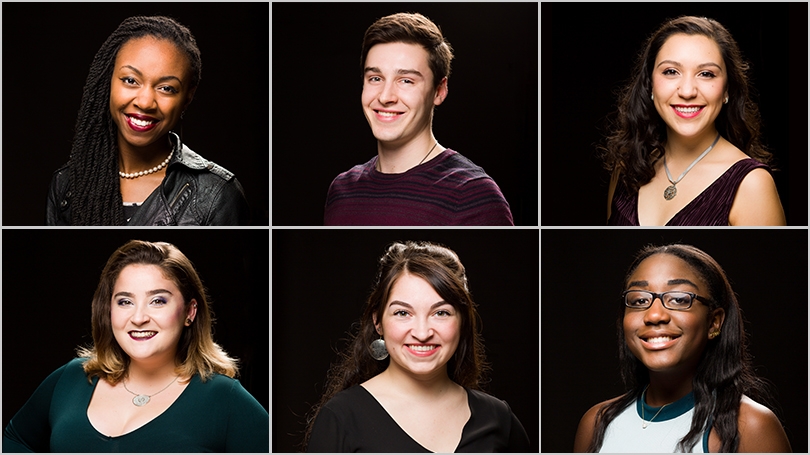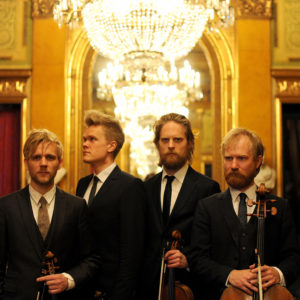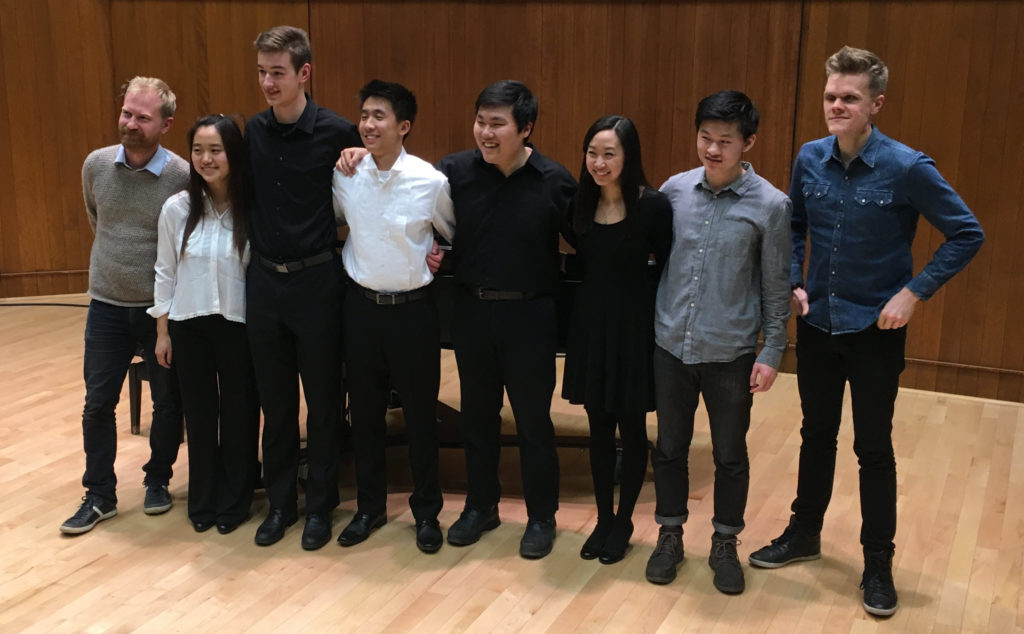This was a very nice concert. Starting and closing with Bach, with Schumann in between, and a short Schumann encore. Not well attended: a smattering of students and the Kendal crowd.
Music
Dartmouth Idol 2017
 At 8 pm, a long line stretched through the Hop. The lead trumpeter for the band had collapsed, had CPR, and was taken by ambulance to the hospital. We learned this during the show, which started quite late. Fortunately, the other trumpeter (David Ellis?) was able to sight read the lead trumpet parts, and the show went on!
At 8 pm, a long line stretched through the Hop. The lead trumpeter for the band had collapsed, had CPR, and was taken by ambulance to the hospital. We learned this during the show, which started quite late. Fortunately, the other trumpeter (David Ellis?) was able to sight read the lead trumpet parts, and the show went on!
This was a strong slate of finalists, all great singers. For the first half, each sang a solo. In particular, Tyné Freeman sang Black Gold, with a great overhead video celebrating black people. She had been in the master class with Cécile McLorin Salvant in September. Brooke Bazarian sang God Bless the Child, one of my favorites, and one of the few songs I recognized. The 2 weakest singers, but not by much, were Alyssa and Trevor. Of course, Alyssa sang first, and that is a hard slot.
In the second half, each singer sang a duet with a past Dartmouth Idol winner or finalist. I was glad to see Nikhil Arora back. I had voted for him last year, and thought he should have won. He was also a background vocalist, many of whom were Idol alumni like him. Tyné sang a duet with Grace Carney last year’s winner, but it was really two songs, with Tyné singing the first one, and Grace singing the second one, mostly solo.
Host Rachel Dratch was hilarious, especially with her reference to her dorm rooms at the River Cluster. Hopefully the Trustees in attendance will pay attention to the problem of student housing. But she was very good, and very funny throughout. The judges were appropriately complimentary, with good feedback from Kaitlyn, and some zany stuff from Deby. The unofficial co-host was Walt Cunningham, who, as always, talked a bit too much about himself, but he does know how to put on a great show.
This year the voting was electronic, so you sent a text to 650-600-9016 with a number code (140917 for Tyné). That went smoothly, and it meant that they could announce the winner, Brooke Bazarian within minutes. The stage was full for the final song, to serenade us as we left into a cold winter night.
It is a real treat to have this show available to us at Dartmouth – thanks Walt!
Dartmouth News Article: Starry, Starry Night: Dartmouth Idol Finalists Take the Stage
April 27 Follow-up: Finally the true story about why the show was delayed.
PAN Project
This was an unusual event held at Rollins Chapel. As it was a snowy night, there weren’t a lot of people at the show, but most of those present were students.
The actual program was:
- Kangwon
- Dreams
- Hidden Landscape
- Sugunga
- Yi-Gu Ren: Thinking of an old Friend
- Prism
- Lullaby
- Diu Diu Dang
The pieces were introduced mostly by Jeffrey Roberts, who played a flat zither-like instrument called the guqin. It was not loud enough compared to the other instruments
The other speaker was Kaoru Watanabe, who played flutes and drums. He had been part of Kodo Taiko drum group, that I have seen before at the Hop. He wrote Prism and the Lullaby, and this latter was my favorite.
Ying-Chieh Wang played the erhu, a Chinese violin, which has a nice strong sound.
Gamin played the piri, like a bamboo recorder, with a screechy sound a bit like a kazoo. She also played a very unusual instrument that looked like a big hookah, called a saenghwang. It had a beautiful windy kind of sound.
Woonjung Sim played Korean drums.
Danish String Quartet
 The concert started off with a modern piece called Swans Kissing. Unpleasant with lots of glissandi. Violinist Fredrik introduced it with reference to a painting of 2 swans, black swan on white background rising from the bottom meeting a white swan on black background from the top.
The concert started off with a modern piece called Swans Kissing. Unpleasant with lots of glissandi. Violinist Fredrik introduced it with reference to a painting of 2 swans, black swan on white background rising from the bottom meeting a white swan on black background from the top.
The second section was a series of folk music. One from the Faero Islands, another from the oldest recorded song, some old codex. They played their own “New Waltz”, and a lively reel.
The second half was Beethoven’s Razumovsky Quartet, No. 2 in E Minor. This was a beautiful piece. The first movement is one I have listened to many times, but the whole is complex, with so many great sections.
This garnered an ovation, which led to a short but beautiful Nielsen piece as an encore.
From the discussion we learned that Nielsen wrote many popular songs that all Danes know, suitable for many occasians. We also learned about folk music, and the similarity to Celtic music is no doubt due in part that travel to Scotland took 2 days by boat vs 5 days tor travel up the Norwegian coast.
see also the Dartmouth
Danish String Quartet – Master Class

This master class was held as usual in the Faulkner Recital Hall, a very intimate setting.
The first piece was the first movement of Tchaikovsky’s Violin Concerto in D Major played very well by someone Gao, a first year student. Frederik of the gelled hair gave her feedback, focusing on skipping the vibrato and putting more weight on the bow. The idea was to find more of the line of the music. He also worked on timing in the cadenza section. It was a race against the clock, as the movement is fairly long. I’m not sure how well all this came across.
The second piece was by the informally named “Oreo Quartet” with Brian, David, Eddie Pyun and a young woman. They played Beethoven’s String Quartet in E Flat Major, the “Harp Quartet”. Most of the critique was led again by Frederik the violinist. He felt that they should play faster. In a telling sequence, he said they were spending too much time looking around at each other. He had them play a sequence with their eyes closed right from the start (using breathing as the cue). It was remarkably effective, as the quartet played even better.
The third piece was Beethoven’s 4th Sonata for Cello by Richard Lu. In this case, cellist Fredrik Sjölin let the critique. He brought out his cello, which was effective to compare playing, but his suggestions were a bit more difficult to understand. I chuckled when he plucked a string by mistake and said that he should try to avoid the “Robin Hood” which he explained was the twang of a string like shooting an arrow.
